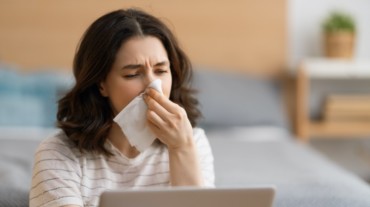
Diwali time calls for deep cleaning in our homes. Be it cleaning dust-laden shelves, sprucing up cupboards or uprooting hidden spiderwebs, we are on a cleaning spree left, right and centre. But what if that comes at the cost of our health? Yes, that accumulated dust can aggravate an existing dust allergy. And the changing season doesn’t help either!
Our body is reactive and sensitive to all varieties of factors such as the food we eat, bacteria, humidity, pollution levels, dust, and sun. Especially when it comes to dust, we are prone to developing allergies, which are caused due to an allergic reaction to tiny bugs that reside in the dust particles. This issue is faced by millions of people across the world, causing redness and itching in the eyes, watery eyes, and sneezing.
To better understand how to combat the menace of dust allergy, we spoke to Dr Vikas Maurya – Director and Head of Department – Pulmonology, Fortis Hospital, Shalimar Bagh, New Delhi.

Dr Maurya informed us that, “This is the time when the season is changing. Winters are setting in and Diwali preparations are at its peak. Diwali cleaning is thought to be very auspicious. It helps in removing germs, fungus and other harmful substances from the house, apart from visible dust and thereby improves the overall health of the people.” Therefore, the seasonal shift coupled with onset of Diwali cleaning could be a trigger for development of dust allergy.
“Dust not only contains mites, but also contains bacteria and small insects as well,” he stated. Hence, people who are allergic to dust, may experience certain side effects. Dr Maurya mentioned that dust allergy can cause Inflammation in the nose as well as in the airways, which further leads to:

Dr Maurya recommends adopting the following measures to combat dust allergy:
1. Cleaning the house: Wear a mask while cleaning the house. “This will prevent dust from going into your respiratory tract, causing acute symptoms,” he stated. He adds, “Use wet wipes or clothes for dusting. This will prevent dust from spreading in the air and getting inhaled by your respiratory tract.” Regarding respiratory issues, he highlights that, “Asthmatics and people who are sensitive to allergens should definitely avoid dusting, and if absolutely necessary, should take all precautions. They should also take their medicines regularly.”
2. Preventive measures in the house: “Keep the indoors humidity-free, as this will prevent an increase in dust mites,” mentioned Dr Maurya. He also recommends using high-efficiency filters in the air conditioning unit inside the house to filter out dust particles. For your pillows and bed linens, he suggests, “Use mite-proof linens.”
3. Build resilience and be vigilant: Emphasise keeping your immunity strong by having a healthy diet with protein, vitamins, and minerals. This will help fight respiratory attacks. Moreover, “regular exercise and yoga help in improving respiratory health,” he recommends. Apart from that, he suggests being vigilant and visiting a doctor in case help is required.
According to the doctor, these measures can help in reducing or mitigating the effect of dust allergy on sensitive individuals, as well as prevent acute symptoms and health deterioration.
Select Topics of your interest and let us customize your feed.
PERSONALISE NOW